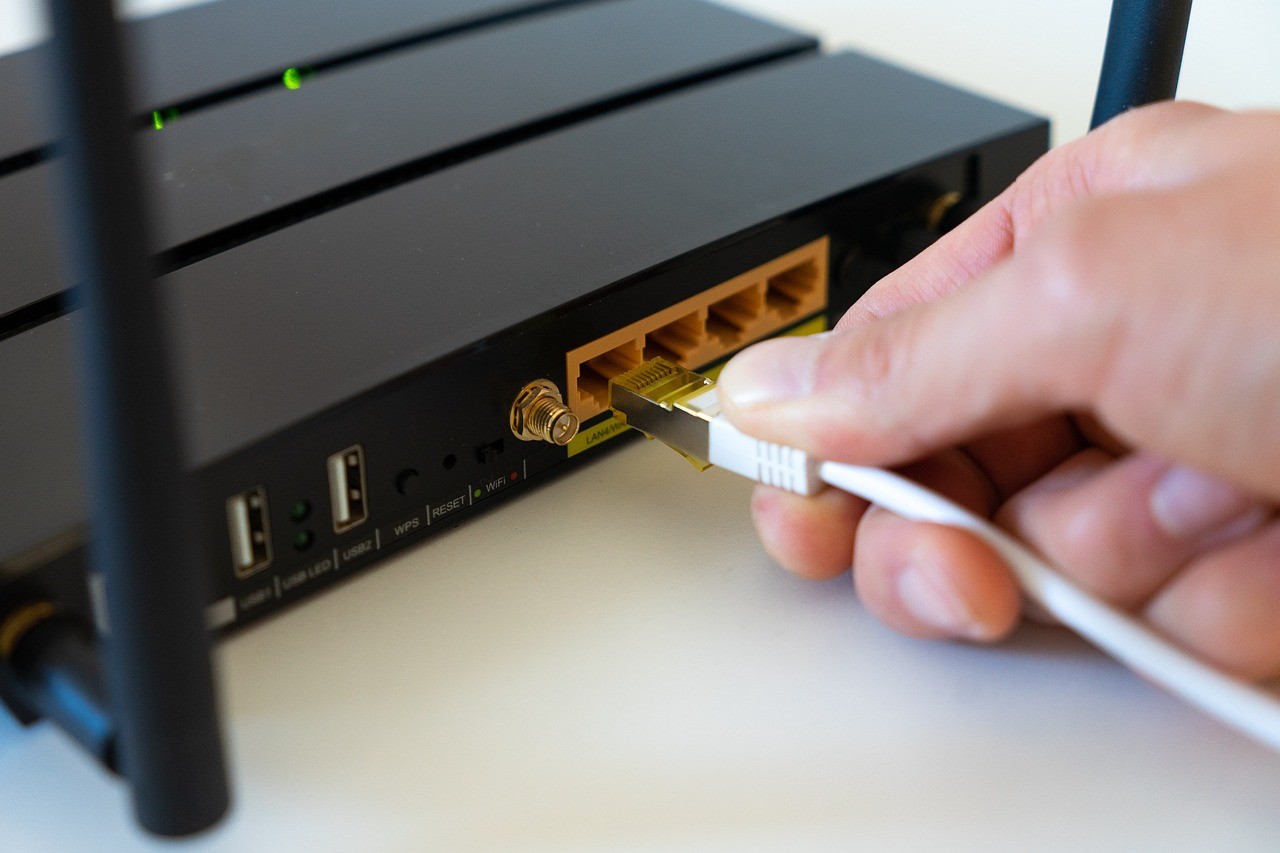In today’s interconnected world, smart home devices, particularly the Ring Doorbell, have become essential for many homeowners. The Ring Doorbell, known for its user-friendly features and exceptional security capabilities, operates seamlessly with a robust and stable WiFi connection.
However, not every router is up to the task. As Ring devices, including cameras and the notable Chime Pro, become more integrated into our daily lives, the demand for a compatible router that provides uninterrupted WiFi coverage has grown exponentially.
In this guide, we’ll delve into the routers for Ring Doorbell, highlighting those models designed to provide a powerful WiFi signal across various sq ft, ensuring your security features remain active and efficient.
Whether you’re looking for a mesh WiFi system for whole-home coverage, advanced features for gaming, or simple setup processes, we have got you covered. Discover the top routers on the market, perfectly tailored for your Ring products.
Best Routers for Ring Doorbells:
1. Google Nest Wifi
With its extensive history in technology innovation, Google presents the Google Nest WiFi – a mesh WiFi system crafted for those seeking expansive and seamless coverage. A consistent and robust connection is paramount, particularly when pairing with devices like the Ring Doorbell.
The Google Nest WiFi – AC2200 – Mesh WiFi System is a testament to its quality, extensive coverage, user-friendly setup, and top-notch security. While it does come with a higher price tag, the slew of features and the peace of mind, it offers make it an excellent choice for those invested in the Ring ecosystem or seeking a robust home network solution.
Product Features:
- Mesh WiFi System: The Google Nest WiFi is designed to provide a blanket of coverage throughout your home, ensuring no dead zones.
- AC2200 Speed Rating: With high-speed capabilities, this router can serve many devices simultaneously.
- Easy Management: Via the Google Home app, managing devices, setting parental controls, and optimizing your network has never been easier.
- Advanced Security: Google Nest brings advanced security features that shield your network from potential threats.
- Integration with Google Ecosystem: Perfect for homes that utilize Google smart devices, creating a streamlined smart home experience.
Pros:
- Broad Coverage: The router promises up to 2200 sq ft of consistent WiFi coverage, ideal for larger homes.
- User-Friendly: The setup process is simple and can be done in minutes, even for those who need to be tech-savvy.
- Security Measures: Advanced security features ensure your devices, especially your Ring Doorbell, remain safe from cyber vulnerabilities.
- Stable Dual-band Connection: The router guarantees a steady connection, essential for real-time monitoring devices like the Ring Doorbell.
- Google Home Compatibility: This router’s integration is a bonus for those already using Google smart devices.
Cons:
- Premium Price Point: The Google Nest WiFi comes at a higher cost than some other routers in the market.
- Dependency on Google Home App: While the app makes setup easy, it’s also necessary for most router management, which might not appeal to everyone.
- Limited Advanced Customization: Those seeking detailed network customization might find the user-friendly nature of the Google Home app a bit restrictive.
2. Amazon eero Pro 6 tri-band mesh Wi-Fi 6 router with built-in Zigbee smart home hub
Amazon’s eero series has always aimed at simplifying Wi-Fi at home, and with the eero Pro 6, the brand takes a massive leap in providing speed, coverage, and reliability. Engineered for homes with several internet-connected devices, such as the Ring Doorbell, this router promises a seamless internet experience without the hiccups of traditional Wi-Fi systems.
The Amazon eero Pro 6 is a testament to next-generation Wi-Fi systems, offering robust features tailored for the modern smart home. Its impressive coverage and tri-band system make it aptly suited for homes with many connected devices. While the price point may be a deterrent for some, the performance, ease of use, and expandability make it a worthy consideration for those prioritizing a seamless internet experience.
Product Features:
- Tri-band mesh Wi-Fi 6 System ensures faster speeds, better performance, and a broader range than its predecessors.
- Extensive Coverage: One eero Pro 6 covers up to 2,000 sq. ft., which is excellent for most medium-sized homes.
- Easy Setup and Management: The eero app allows for simple setup device management and provides insights into your network’s performance.
- Advanced Security: With eero Secure, users can benefit from an additional layer of protection, ensuring a safer browsing experience.
- Integration with Alexa: Allows for voice commands, making it simple to manage and check the status of your network.
Pros:
- Wi-Fi 6 Compatibility: Provides faster speeds and a better response rate, which is particularly beneficial for high-demand devices.
- Expandable Coverage: While one device covers 2,000 sq. ft, you can quickly expand the system with more eero units for larger homes.
- Seamless Performance: The tri-band system ensures that multiple devices can be used simultaneously without lag or buffering.
- Effortless Setup: With the eero app, setting up the router is a breeze, making it ideal for those who need to be tech-savvy.
- Tight Security: eero Secure offers features like ad blocking, threat scans, and content filters for enhanced protection.
Cons:
- Subscription Model: Some advanced security features come with a monthly subscription fee.
- Higher Price Range: The eero Pro 6 is a premium product and might not fit everyone’s budget.
- Limited Customization: Advanced users might find the eero system’s settings restrictive compared to other high-end routers.
3. Ring Chime Pro
The Ring Chime Pro is not just a conventional Wi-Fi extender; it’s tailor-made to enhance the Ring Doorbell’s functionality, ensuring that users never miss a Ring event. It bridges your Ring devices and the Wi-Fi network, providing a stronger, more reliable connection and amplifying notifications throughout the home. Let’s delve into its features, pros, and cons.
The Ring Chime Pro is essential to households heavily invested in the Ring ecosystem. While it does act as a Wi-Fi extender, its primary value lies in enhancing the performance and reach of Ring devices. Its user-friendly interface and added features like customizable chime tones make it a convenient choice. The Chime Pro is a worthy consideration for those dedicated to the Ring ecosystem. However, you should explore other options if you’re looking for a traditional Wi-Fi extender with broader capabilities.
Product Features:
- Extended Wi-Fi Coverage: Designed to amplify the Wi-Fi signal, ensuring all Ring devices maintain a stable connection.
- Built-in Chime: Amplifies Ring device notifications, ensuring you hear alerts even if your phone isn’t around.
- Multiple Chime Tones: Users can select from various chime tones, allowing customization of the alert sounds.
- Do Not Disturb Mode: Turn off audio notifications for specific periods.
- Easy Setup: Connects easily with other Ring devices through the Ring app, streamlining the setup process.
Pros:
- Purpose-Built Design: Designed for Ring devices, ensuring optimal performance and compatibility.
- Increased Connectivity: Helps in areas with weak Wi-Fi signals, ensuring all Ring devices stay connected and operational.
- Audible Alerts: The built-in chime is a bonus for when you miss a notification on your phone.
- Customization: With multiple chime tones, users can personalize their notification sounds.
- Sleek Design: The compact and modern design blends with most home decor.
Cons:
- Limited to Ring Ecosystem: While it’s a strength in one aspect, the device’s focus on the Ring ecosystem can be limiting if you have a variety of smart devices from different brands.
- Price: Given its specialized nature, it might seem pricier than generic Wi-Fi extenders.
- Limited Advanced Features: It does not have the breadth of features that some advanced users might seek in a Wi-Fi extender.
4. NETGEAR Orbi Tri-band Whole Home Mesh WiFi System
In the realm of whole-home mesh Wi-Fi systems, NETGEAR’s Orbi is a standout, offering exceptional range, speed, and reliability. Having a reliable and broad-reaching network is vital for those using devices like Ring Doorbell. The Orbi, with its tri-band technology and impressive coverage, fits the bill. Let’s delve deeper into its features, pros, and cons.
The NETGEAR Orbi Tri-band Whole Home Mesh Wi-Fi System is an exceptional choice for large homes and those looking for consistent and fast Wi-Fi. It’s particularly suitable for devices like Ring Doorbell, ensuring a stable home connection. The added security features and easy-to-use app make it user-friendly and secure. While the price point might be a deterrent for some, the value offered in terms of performance and coverage could justify the investment for many homeowners.
Product Features:
- Tri-Band Technology: Unlike traditional routers, Orbi uses an additional third band that provides a dedicated backhaul connection between the router and satellite, ensuring faster and more reliable connectivity.
- Extensive Coverage: Cover homes up to 5,000 sq ft with strong Wi-Fi signals.
- Seamless Roaming: Allows users to move around the house with their devices without losing connectivity or switching networks.
- NETGEAR Armor: Offers built-in anti-virus and data theft protection for all connected devices.
- Easy Setup: With the Orbi app, users can set up their network, monitor connected devices, and control their Wi-Fi settings.
Pros:
- Powerful Performance: Its tri-band technology promises faster internet speeds even with multiple devices connected.
- Broad Coverage: The 5,000 sq ft coverage ensures larger homes remain free of Wi-Fi dead zones.
- Security: Including NETGEAR Armor provides an added layer of security against online threats.
- Guest Network: Allows users to create a separate network for guests, ensuring the primary network remains secure.
- Aesthetically Pleasing: The sleek design of the router and satellite ensures it blends easily into any home setting.
Cons:
- Price Point: The Orbi tends to be on the pricier side compared to some other mesh systems.
- Size: While aesthetically designed, the units are relatively more significant than some competing mesh systems.
- Limited Advanced Customization: Some tech-savvy users might find the customization options limiting.
5. TP-Link Deco Mesh WiFi System(Deco M5)
The TP-Link Deco Mesh WiFi System, specifically the Deco M5 model, is designed to create a unified and seamless network environment that covers every nook and cranny of your home. It’s a solution many turn to when they require consistent WiFi coverage, especially for devices that rely on a stable connection, like the Ring Doorbell. Here’s a deep dive into its features, advantages, and disadvantages.
The TP-Link Deco Mesh WiFi System (Deco M5) offers a balanced solution for those looking to eliminate dead zones and get consistent WiFi coverage across larger areas. It’s especially beneficial for Ring Doorbell users who need stable connectivity to ensure smooth functioning. The system’s security features, ease of use, and sleek design make it an attractive choice for a broad range of users. While it might not offer all the advanced features that some tech enthusiasts look for, its affordability and performance make it a solid choice for many households.
Product Features:
- Seamless Connectivity: The Deco M5 creates a singular network environment, ensuring your devices transition seamlessly between Decos without experiencing drops.
- Whole Home Coverage: A pack of three units covers up to 5,500 sq ft, ensuring no dead zones exist.
- Robust Parental Controls: The Deco M5 offers user profiles, allowing tailored settings for different family members.
- TP-Link HomeCare: Provides a suite of features ensuring the network remains safe, including Antivirus, parental controls, and QoS (Quality of Service).
- Easy Setup: Using the Deco app, the setup becomes a breeze. The app also facilitates the management of the network.
Pros:
- Consistent Coverage: The Deco M5 ensures stable and reliable WiFi across your entire home.
- Affordability: Compared to its competitors, the Deco M5 offers value for money, combining performance and an attractive price point.
- Advanced Security: The inbuilt TP-Link HomeCare provides a comprehensive security solution for all connected devices.
- Scalability: You can always add more units to the system if needed.
- Compact and Sleek Design: Its disc-shaped design is both modern and discreet.
Cons:
- Limited Customization: For tech enthusiasts, the Deco M5 might offer limited advanced settings and customization.
- Single SSID: While it provides a seamless connection, some users prefer separate SSIDs for different bands.
- No Dedicated Backhaul: Unlike some tri-band competitors, the Deco M5 doesn’t have a dedicated backhaul channel, which could affect speeds when multiple devices are connected.
Tips on Choosing
Coverage Area:
Consider the size of your home. For larger homes or homes with multiple floors, a mesh WiFi system can cover every corner, eliminating dead zones where your Ring Doorbell might be located.
Compatibility:
Ensure that your router or mesh system is compatible with Ring products. Most modern routers should be but always double-check.
Frequency Bands:
Dual-band or tri-band routers can offer better performance. While Ring Doorbell can work on both 2.4GHz and 5GHz bands, a dual-band router can help distribute device load, ensuring smoother operation.
Speed:
Gigabit speeds might not be necessary for Ring Doorbell, but faster speeds can ensure optimal performance for all devices if you have multiple devices connected at home.
Security Features:
Since the Ring Doorbell is a security device, ensuring your router has robust security features is crucial. Look for features like WPA3 encryption, VPN support, and guest network capabilities.
Ease of Setup and Management:
Some modern routers and mesh systems have intuitive apps that make setup and management a breeze. It’s convenient for those not technically inclined.
Expandability:
If you expand your home or add more devices in the future, consider systems that allow for easy expansion, like adding more mesh nodes.
Stability:
The reliability of the connection is crucial for devices like Ring Doorbell. Read user reviews to ensure your chosen router or mesh system offers consistent connectivity.
Dedicated Backhaul:
If opting for a mesh system, having a dedicated backhaul (a separate channel for data exchange between mesh nodes) can help retain speeds throughout your home.
Integrated Features:
Some routers have integrated features like WiFi extenders (e.g., Ring Chime Pro), which can further boost signals to devices like Ring Doorbell.
Budget:
While getting a good router is essential, there’s no need to overspend if you don’t require the highest-end features. Determine what’s necessary for your setup and buy accordingly.
Customer Support and Warranty:
A router with good customer support can be a lifesaver if issues arise. Additionally, consider the warranty provided, ensuring your investment is protected for a reasonable period.
Remember, while the Ring Doorbell might be a primary reason for your purchase, considering the broader ecosystem of devices in your home can ensure you choose a router that serves all your needs effectively.
FAQs
Do I need a special router for my Ring Doorbell?
While Ring Doorbell can work with most modern routers, choosing a high-quality and compatible router ensures optimal performance, especially if multiple devices are connected to your WiFi network.
What’s the difference between a regular router and a mesh WiFi system?
A regular router broadcasts WiFi from a single point. In contrast, a mesh WiFi system uses multiple nodes around your home to ensure comprehensive coverage, reducing dead zones and ensuring stable connectivity.
Can I use my existing cable modem with a new router?
Yes, most routers can work with existing cable modems. However, ensure the modem supports the speeds and standards of your new router for the best performance.
Why is my Ring Doorbell’s video feed lagging despite having a good router?
Many factors can affect performance, including distance from the router, physical obstructions, and interference from other devices. Consider using a WiFi extender or placing the router closer to the Ring device.
How do dual-band and tri-band differ?
Dual-band routers broadcast on two frequencies: 2.4GHz and 5GHz. Tri-band routers have an additional 5GHz band, offering better distribution of devices and better performance.
Do all routers support the Ring app?
The Ring app communicates directly with your Ring devices and doesn’t require special router support. However, having a stable and robust WiFi network (provided by the router) ensures the app works seamlessly.
Is it challenging to set up a new router or mesh system?
Most modern routers and mesh systems are designed for user-friendly setup, often accompanied by intuitive apps that guide you through the process.
How often should I update or replace my router?
It’s advisable to regularly update your router’s firmware for security and performance enhancements. As for replacement, if your router is more than 4-5 years old or experiencing consistent issues, it might be time for an upgrade.
Do routers offer security features for devices like Ring Doorbell?
Modern routers come with various security features, such as WPA3 encryption and firewalls, which can add an extra layer of protection to connected devices, including Ring Doorbell.
Can I use two different brands of routers together, like a main router and a mesh node?
While technically possible, using the same brand and model for compatibility, seamless integration, and optimal performance is often best.
Choosing the right router can significantly impact your Ring Doorbell’s performance and your overall home network experience. Ensure you pick one that suits your home’s size, layout, and the number of connected devices.
Conclusion
The Ring Doorbell stands out as a popular and practical choice in smart home security. Yet, its efficiency largely depends on the strength and reliability of your home’s WiFi network. A robust router or mesh WiFi system can profoundly influence the performance of your Ring Doorbell, ensuring seamless video feeds, quicker alerts, and an overall enhanced user experience.
Investing in a top-tier router benefits your Ring device and other devices vying for bandwidth in your home. Whether you’re seeking extensive coverage, advanced security features, or lightning-fast speeds, there’s a router tailored to your needs. It’s crucial to ensure your Ring Doorbell functions optimally by powering it with the routers available today.



